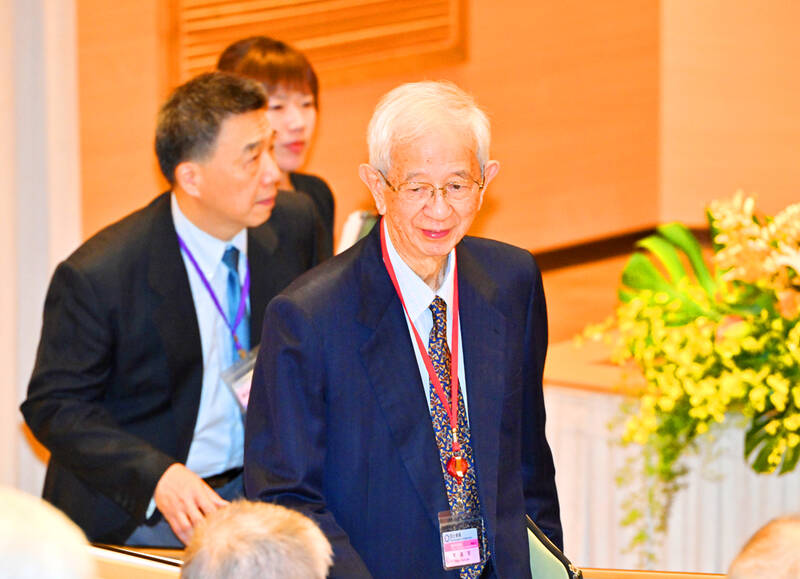Former Academia Sinica president Lee Yuan-tseh (李遠哲) yesterday said that he has accepted President William Lai’s (賴清德) invitation to serve as a consultant on his National Climate Change Strategy Committee, adding that he agreed with proposals to continue using nuclear energy.
The committee was one of three established one month after Lai took office on May 20, along with the Whole-of-Society Defense Resilience Committee and the Healthy Taiwan Promotion Committee.
Pegatron Group (和碩集團) chairman Tung Tzu-hsien (童子賢), who supports the use of nuclear energy, has been retained by the president to serve as the deputy convener of the climate change committee.

Photo: Tien Yu-hua, Taipei Times
Many have perceived the appointment as a significant shift from the “nuclear-free homeland” policy, which the president’s Democratic Progressive Party (DPP) has been espousing for decades.
Lee, 87, told political commentator Huang Kuang-chin (黃光芹) on her online talk show that he accepted Lai’s invitation because he had participated in many net zero emissions meetings around the world and felt obligated to inform the public about the importance of tackling challenges wrought by global warming and greenhouse gas emissions.
That more than 1,000 people died during the pilgrimage to Mecca this year shows that rising global temperatures could gradually turn the Earth into a place that is unfit for human habitation, the Nobel laureate in chemistry said, adding that humans would not survive natural disasters should global temperatures rise by 3°C.
“If we are not actively reducing carbon and greenhouse gas emissions, we could become extinct like the dinosaurs,” Lee said, adding that this is the view of a responsible scientist, rather than exaggerated statements from an alarmist.
The nation’s goal of zero carbon emissions by 2050 cannot be met if the government fails to cut emissions by 50 percent by 2030, he said.
“Nuclear energy still has its disadvantages given the current level of technology, but the potential disasters that it could bring cannot compare with the complete destruction of the human race,” Lee said.
“What Tung said is what he truly believes in, and he expressed his support for nuclear energy as an entrepreneur and from a scientific perspective. The position has made him a target of criticism, but he is heading in the right direction,” he added.
Lai also knows that the reform is necessary for society to change, but he is under a lot of pressure to make the first step, Lee said.
Given the size and density of Taiwan’s population, the nation cannot sustain itself by simply using renewable energy to replace the use of fossil fuels without using nuclear energy, or extending the use of existing nuclear power plants, Lee said.

CHAOS: Iranians took to the streets playing celebratory music after reports of Khamenei’s death on Saturday, while mourners also gathered in Tehran yesterday Iranian Supreme Leader Ayatollah Ali Khamenei was killed in a major attack on Iran launched by Israel and the US, throwing the future of the Islamic republic into doubt and raising the risk of regional instability. Iranian state television and the state-run IRNA news agency announced the 86-year-old’s death early yesterday. US President Donald Trump said it gave Iranians their “greatest chance” to “take back” their country. The announcements came after a joint US and Israeli aerial bombardment that targeted Iranian military and governmental sites. Trump said the “heavy and pinpoint bombing” would continue through the week or as long

TRUST: The KMT said it respected the US’ timing and considerations, and hoped it would continue to honor its commitments to helping Taiwan bolster its defenses and deterrence US President Donald Trump is delaying a multibillion-dollar arms sale to Taiwan to ensure his visit to Beijing is successful, a New York Times report said. The weapons sales package has stalled in the US Department of State, the report said, citing US officials it did not identify. The White House has told agencies not to push forward ahead of Trump’s meeting with Chinese President Xi Jinping (習近平), it said. The two last month held a phone call to discuss trade and geopolitical flashpoints ahead of the summit. Xi raised the Taiwan issue and urged the US to handle arms sales to

BIG SPENDERS: Foreign investors bought the most Taiwan equities since 2005, signaling confidence that an AI boom would continue to benefit chipmakers Taiwan Semiconductor Manufacturing Co’s (TSMC, 台積電) market capitalization swelled to US$2 trillion for the first time following a 4.25 percent rally in its American depositary receipts (ADR) overnight, putting the world’s biggest contract chipmaker sixth on the list of the world’s biggest companies by market capitalization, just behind Amazon.com Inc. The site CompaniesMarketcap.com ranked TSMC ahead of Saudi Aramco and Meta Platforms Inc. The Taiwanese company’s ADRs on Tuesday surged to US$385.75 on the New York Stock Exchange, as strong demand for artificial intelligence (AI) applications led to chip supply constraints and boost revenue growth to record-breaking levels. Each TSMC ADR represents

State-run CPC Corp, Taiwan (CPC, 台灣中油) yesterday said that it had confirmed on Saturday night with its liquefied natural gas (LNG) and crude oil suppliers that shipments are proceeding as scheduled and that domestic supplies remain unaffected. The CPC yesterday announced the gasoline and diesel prices will rise by NT$0.2 and NT$0.4 per liter, respectively, starting Monday, citing Middle East tensions and blizzards in the eastern United States. CPC also iterated it has been reducing the proportion of crude oil imports from the Middle East and diversifying its supply sources in the past few years in response to geopolitical risks, expanding